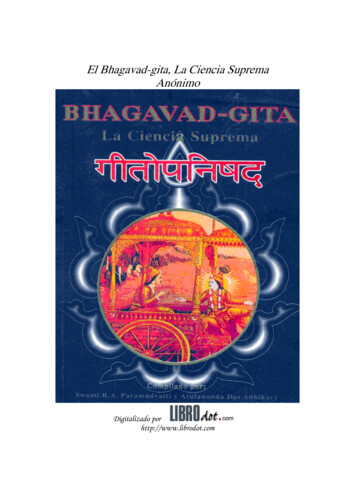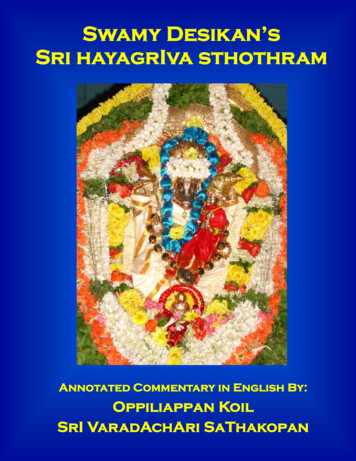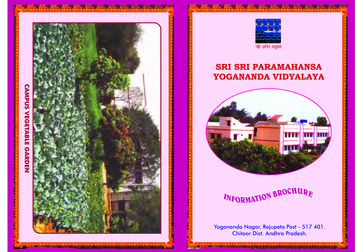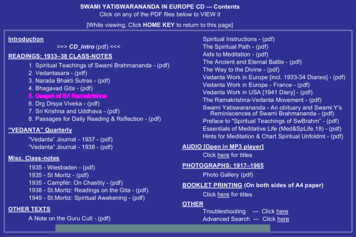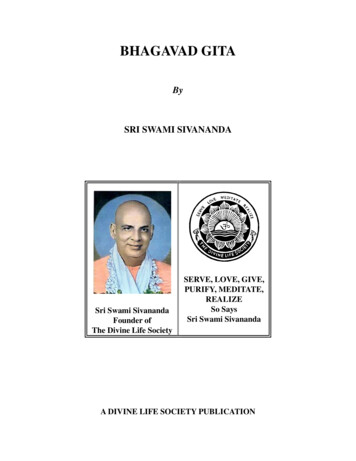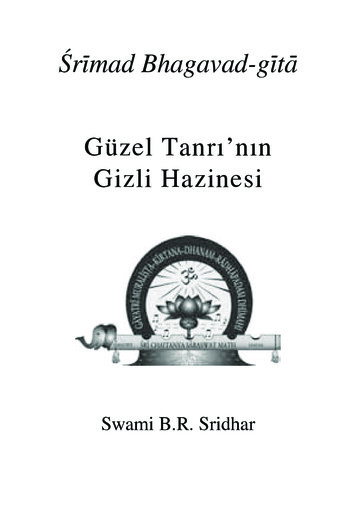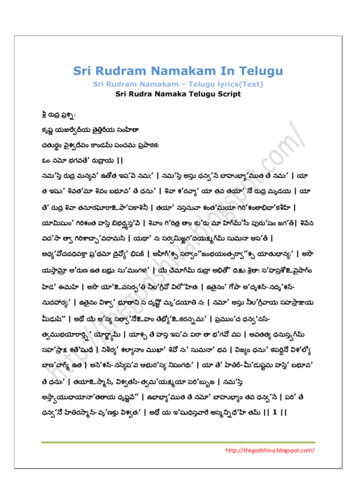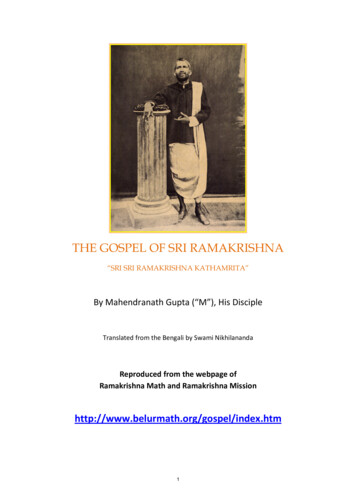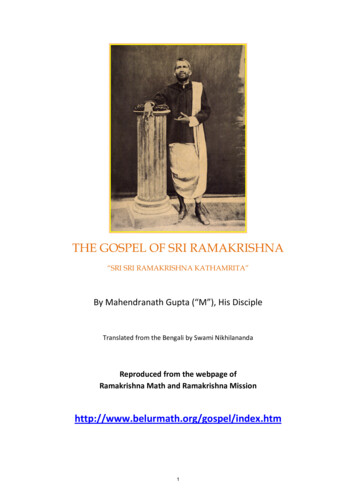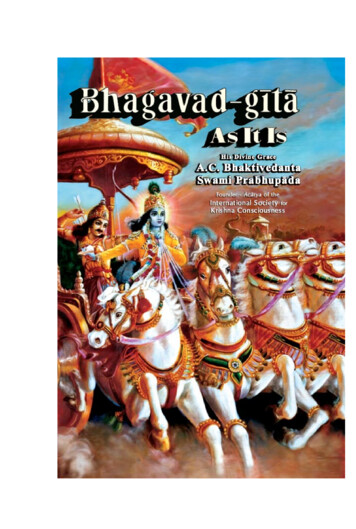
Transcription
Bhagavad-gītāAs It IsCOMPLETE EDITIONwith original Sanskrit text, Roman transliteration, Englishequivalents, translation and elaborate purportsHis Divine GraceA.C. Bhaktivedanta SwamiPrabhupādaFounder-Ācārya of the International Society for KrishnaConsciousnessCollier Books, New YorkCollier Macmillan Publishers, LondonCopyright 1972 by His Divine GraceA.C. Bhaktivedanta Swami Prabhupāda
TABLE OF CONTENTSForewordPrefaceIntroductionCHAPTER ONEObserving the Armies on the Battlefield ofKurukṣetraCHAPTER TWOContents of the Gītā SummarizedCHAPTER THREEKarma-yogaCHAPTER FOURTranscendental KnowledgeCHAPTER FIVEKarma-yoga—Action in Kṛṣṇa ConsciousnessCHAPTER SIXSāṅkhya-yogaCHAPTER SEVENKnowledge of the AbsoluteCHAPTER EIGHTAttaining the SupremeCHAPTER NINEThe Most Confidential KnowledgeCHAPTER TENThe Opulence of the AbsoluteCHAPTER ELEVENThe Universal FormCHAPTER TWELVEDevotional ServiceCHAPTER THIRTEENNature, the Enjoyer, and ConsciousnessCHAPTER FOURTEENThe Three Modes of Material NatureCHAPTER FIFTEENThe Yoga of the Supreme PersonCHAPTER SIXTEENThe Divine and Demoniac NaturesCHAPTER SEVENTEENThe Divisions of FaithCHAPTER EIGHTEENConclusion—The Perfection of Renunciation
108 SLOKAS FROM BHAGAVAD ant-bhagavad-gita-slokas/COMPILED FROM- 2.622.632.642.6912051133127157245510
BG-1Bg. 1.1धतृ राष्ट्र उवाचधमर् ेत्रे कुरु ेत्रे समवेता ययु त्ु सव: ।मामका: पाण्डवाश्चैव कमकुवर्त सञ्जय ॥ १ ॥dhṛtarāṣṭra uvācadharma-kṣetre kuru-kṣetresamavetā yuyutsavaḥmāmakāḥ pāṇḍavāś caivakim akurvata sañjayaSynonymsdhṛtarāṣṭraḥ uvāca — King Dhṛtarāṣṭra said; dharma-kṣetre — in the place ofpilgrimage; kuru-kṣetre —intheplacenamedKurukṣetra; samavetāḥ —assembled; yuyutsavaḥ — desiring to fight; māmakāḥ — my party (sons); pāṇḍavāḥ —the sons of Pāṇḍu; ca — and; eva — certainly; kim — what; akurvata — did theydo; sañjaya — O Sañjaya.TranslationDhṛtarāṣṭra said: O Sañjaya, after my sons and the sons of Pāṇḍu assembled in theplace of pilgrimage at Kurukṣetra, desiring to fight, what did they do?PurportBhagavad-gītā is the widely read theistic science summarized in the Gītāmāhātmya (Glorification of the Gītā). There it says that one should read Bhagavadgītā very scrutinizingly with the help of a person who is a devotee of Śrī Kṛṣṇa and try tounderstand it without personally motivated interpretations. The example of clearunderstanding is there in the Bhagavad-gītā itself, in the way the teaching is understoodby Arjuna, who heard the Gītā directly from the Lord. If someone is fortunate enough tounderstand the Bhagavad-gītā in that line of disciplic succession, without motivatedinterpretation, then he surpasses all studies of Vedic wisdom, and all scriptures of theworld. One will find in the Bhagavad-gītā all that is contained in other scriptures, but thereader will also find things which are not to be found elsewhere. That is the specificstandard of the Gītā. It is the perfect theistic science because it is directly spoken by theSupreme Personality of Godhead, Lord Śrī Kṛṣṇa.The topics discussed by Dhṛtarāṣṭra and Sañjaya, as described in the Mahābhārata, formthe basic principle for this great philosophy. It is understood that this philosophy evolvedon the Battlefield of Kurukṣetra, which is a sacred place of pilgrimage from theimmemorial time of the Vedic age. It was spoken by the Lord when He was presentpersonally on this planet for the guidance of mankind.The word dharma-kṣetra (a place where religious rituals are performed) is significantbecause, on the Battlefield of Kurukṣetra, the Supreme Personality of Godhead waspresent on the side of Arjuna. Dhṛtarāṣṭra, the father of the Kurus, was highly doubtfulabout the possibility of his sons’ ultimate victory. In his doubt, he inquired from hissecretary Sañjaya, “What did they do?” He was confident that both his sons and the sonsof his younger brother Pāṇḍu were assembled in that Field of Kurukṣetra for a determinedengagement of the war. Still, his inquiry is significant. He did not want a compromise
between the cousins and brothers, and he wanted to be sure of the fate of his sons on thebattlefield. Because the battle was arranged to be fought at Kurukṣetra, which ismentioned elsewhere in the Vedas as a place of worship – even for the denizens of heaven– Dhṛtarāṣṭra became very fearful about the influence of the holy place on the outcome ofthe battle. He knew very well that this would influence Arjuna and the sons of Pāṇḍufavorably, because by nature they were all virtuous. Sañjaya was a student of Vyāsa, andtherefore, by the mercy of Vyāsa, Sañjaya was able to envision the Battlefield ofKurukṣetra even while he was in the room of Dhṛtarāṣṭra. And so, Dhṛtarāṣṭra asked himabout the situation on the battlefield.Both the Pāṇḍavas and the sons of Dhṛtarāṣṭra belong to the same family, but Dhṛtarāṣṭra’smind is disclosed herein. He deliberately claimed only his sons as Kurus, and he separatedthe sons of Pāṇḍu from the family heritage. One can thus understand the specific positionof Dhṛtarāṣṭra in his relationship with his nephews, the sons of Pāṇḍu. As in the paddyfield the unnecessary plants are taken out, so it is expected from the very beginning ofthese topics that in the religious field of Kurukṣetra, where the father of religion, ŚrīKṛṣṇa, was present, the unwanted plants like Dhṛtarāṣṭra’s son Duryodhana and otherswould be wiped out and the thoroughly religious persons, headed by Yudhiṣṭhira, wouldbe established by the Lord. This is the significance of the words dharma-kṣetre and kurukṣetre, apart from their historical and Vedic importance.Bg. �्वभावःपच्ू चेताः ।ृ छा म त्वां धमर्सम्मढयच्छ्रे यः स्यािन्नश ् चतं ब्रू ह तन्मे शष्यस्तेऽहं शा ध मां त्वां प्रपन्नम ् ॥ ७ i tvāṁ dharma-sammūḍha-cetāḥyac chreyaḥ syān niścitaṁ brūhi tan meśiṣyas te ’haṁ śādhi māṁ tvāṁ prapannamSynonymskārpaṇya — of miserliness; doṣa — by the weakness; upahata — beingafflicted; svabhāvaḥ — characteristics; pṛcchāmi — I am asking; tvām — untoYou; dharma —religion; sammūḍha —bewildered; cetāḥ —inheart; yat —what; śreyaḥ — all-good; syāt — may be; niścitam — confidently; brūhi — tell; tat —that; me — unto me; śiṣyaḥ — disciple; te — Your; aham — I am; śādhi — justinstruct; mām — me; tvām — unto You; prapannam — surrendered.TranslationNow I am confused about my duty and have lost all composure because of miserlyweakness. In this condition I am asking You to tell me for certain what is best for me.Now I am Your disciple, and a soul surrendered unto You. Please instruct me.PurportBy nature’s own way the complete system of material activities is a source of perplexityfor everyone. In every step there is perplexity, and therefore it behooves one to approach a
bona fide spiritual master who can give one proper guidance for executing the purpose oflife. All Vedic literatures advise us to approach a bona fide spiritual master to get freefrom the perplexities of life, which happen without our desire. They are like a forest firethat somehow blazes without being set by anyone. Similarly, the world situation is suchthat perplexities of life automatically appear, without our wanting such confusion. No onewants fire, and yet it takes place, and we become perplexed. The Vedic wisdom thereforeadvises that in order to solve the perplexities of life and to understand the science of thesolution, one must approach a spiritual master who is in the disciplic succession. A personwith a bona fide spiritual master is supposed to know everything. One should not,therefore, remain in material perplexities but should approach a spiritual master. This isthe purport of this verse.Who is the man in material perplexities? It is he who does not understand the problems oflife. In the Bṛhad-āraṇyaka Upaniṣad (3.8.10) the perplexed man is described asfollows: yo vā etad akṣaraṁ gārgy aviditvāsmāḻ lokāt praiti sa kṛpaṇaḥ. “He is a miserlyman who does not solve the problems of life as a human and who thus quits this world likethe cats and dogs, without understanding the science of self-realization.” This human formof life is a most valuable asset for the living entity, who can utilize it for solving theproblems of life; therefore, one who does not utilize this opportunity properly is a miser.On the other hand, there is the brāhmaṇa, or he who is intelligent enough to utilize thisbody to solve all the problems of life. Ya etad akṣaraṁ gārgi viditvāsmāl lokāt praiti sabrāhmaṇaḥ.The kṛpaṇas, or miserly persons, waste their time in being overly affectionate for family,society, country, etc., in the material conception of life. One is often attached to familylife, namely to wife, children and other members, on the basis of “skin disease.”The kṛpaṇa thinks that he is able to protect his family members from death; orthe kṛpaṇa thinks that his family or society can save him from the verge of death. Suchfamily attachment can be found even in the lower animals, who take care of children also.Being intelligent, Arjuna could understand that his affection for family members and hiswish to protect them from death were the causes of his perplexities. Although he couldunderstand that his duty to fight was awaiting him, still, on account of miserly weakness,he could not discharge the duties. He is therefore asking Lord Kṛṣṇa, the supreme spiritualmaster, to make a definite solution. He offers himself to Kṛṣṇa as a disciple. He wants tostop friendly talks. Talks between the master and the disciple are serious, and now Arjunawants to talk very seriously before the recognized spiritual master. Kṛṣṇa is therefore theoriginal spiritual master of the science of Bhagavad-gītā, and Arjuna is the first disciplefor understanding the Gītā. How Arjuna understands the Bhagavad-gītā is stated inthe Gītā itself. And yet foolish mundane scholars explain that one need not submit toKṛṣṇa as a person, but to “the unborn within Kṛṣṇa.” There is no difference betweenKṛṣṇa’s within and without. And one who has no sense of this understanding is thegreatest fool in trying to understand Bhagavad-gītā.
Bg. 2.11श्री �्वशोचस्त्वं प्र ावादांश्च भाषसे ।गतासूनगतासूंश्च नानुशोचिन्त पिण्डताः ॥ ११ ॥śrī-bhagavān uvācaaśocyān anvaśocas tvaṁprajñā-vādāṁś ca bhāṣasegatāsūn agatāsūṁś canānuśocanti paṇḍitāḥSynonymsśrī-bhagavān uvāca — the Supreme Personality of Godhead said; aśocyān — not worthyof lamentation; anvaśocaḥ — you are lamenting; tvam — you; prajñā-vādān — learnedtalks; ca — also; bhāṣase — speaking; gata — lost; asūn — life; agata — notpassed; asūn — life; ca — also; na — never; anuśocanti — lament; paṇḍitāḥ — thelearned.TranslationThe Supreme Personality of Godhead said: While speaking learned words, you aremourning for what is not worthy of grief. Those who are wise lament neither for theliving nor for the dead.PurportThe Lord at once took the position of the teacher and chastised the student, calling him,indirectly, a fool. The Lord said, “You are talking like a learned man, but you do not knowthat one who is learned – one who knows what is body and what is soul – does not lamentfor any stage of the body, neither in the living nor in the dead condition.” As explained inlater chapters, it will be clear that knowledge means to know matter and spirit and thecontroller of both. Arjuna argued that religious principles should be given moreimportance than politics or sociology, but he did not know that knowledge of matter, souland the Supreme is even more important than religious formularies. And because he waslacking in that knowledge, he should not have posed himself as a very learned man. As hedid not happen to be a very learned man, he was consequently lamenting for somethingwhich was unworthy of lamentation. The body is born and is destined to be vanquishedtoday or tomorrow; therefore the body is not as important as the soul. One who knows thisis actually learned, and for him there is no cause for lamentation, regardless of thecondition of the material body.
Bg. 2.12न त्वेवाहं जातु नासं न त्वं नेमे जना धपाः ।न चैव नभ वष्यामः सव वयमतः परम ् ॥ १२ ॥na tv evāhaṁ jātu nāsaṁna tvaṁ neme janādhipāḥna caiva na bhaviṣyāmaḥsarve vayam ataḥ paramSynonymsna — never; tu — but; eva — certainly; aham — I; jātu — at any time; na — didnot; āsam — exist; na — not; tvam — you; na — not; ime — all these; jana-adhipāḥ —kings; na — never; ca — also; eva — certainly; na — not; bhaviṣyāmaḥ — shallexist; sarve vayam — all of us; ataḥ param — hereafter.TranslationNever was there a time when I did not exist, nor you, nor all these kings; nor in thefuture shall any of us cease to be.PurportIn the Vedas – in the Kaṭha Upaniṣad as well as in the Śvetāśvatara Upaniṣad – it is saidthat the Supreme Personality of Godhead is the maintainer of innumerable living entities,in terms of their different situations according to individual work and reaction of work.That Supreme Personality of Godhead is also, by His plenary portions, alive in the heart ofevery living entity. Only saintly persons who can see, within and without, the sameSupreme Lord can actually attain to perfect and eternal peace.nityo nityānāṁ cetanaś cetanānāmeko bahūnāṁ yo vidadhāti kāmāntam ātma-sthaṁ ye ’nupaśyanti dhīrāsteṣāṁ śāntiḥ śāśvatī netareṣām(Kaṭha Upaniṣad 2.2.13)The same Vedic truth given to Arjuna is given to all persons in the world who posethemselves as very learned but factually have but a poor fund of knowledge. The Lordsays clearly that He Himself, Arjuna and all the kings who are assembled on the battlefieldare eternally individual beings and that the Lord is eternally the maintainer of theindividual living entities both in their conditioned and in their liberated situations. TheSupreme Personality of Godhead is the supreme individual person, and Arjuna, the Lord’seternal associate, and all the kings assembled there are individual eternal persons. It is notthat they did not exist as individuals in the past, and it is not that they will not remaineternal persons. Their individuality existed in the past, and their individuality willcontinue in the future without interruption. Therefore, there is no cause for lamentation foranyone.The Māyāvādī theory that after liberation the individual soul, separated by the coveringof māyā, or illusion, will merge into the impersonal Brahman and lose its individualexistence is not supported herein by Lord Kṛṣṇa, the supreme authority. Nor is the theorythat we only think of individuality in the conditioned state supported herein. Kṛṣṇa clearlysays herein that in the future also the individuality of the Lord and others, as it isconfirmed in the Upaniṣads, will continue eternally. This statement of Kṛṣṇa’s isauthoritative because Kṛṣṇa cannot be subject to illusion. If individuality were not a fact,then Kṛṣṇa would not have stressed it so much – even for the future. The Māyāvādī may
argue that the individuality spoken of by Kṛṣṇa is not spiritual, but material. Evenaccepting the argument that the individuality is material, then how can one distinguishKṛṣṇa’s individuality? Kṛṣṇa affirms His individuality in the past and confirms Hisindividuality in the future also. He has confirmed His individuality in many ways, andimpersonal Brahman has been declared to be subordinate to Him. Kṛṣṇa has maintainedspiritual individuality all along; if He is accepted as an ordinary conditioned soul inindividual consciousness, then His Bhagavad-gītā has no value as authoritative scripture.A common man with all the four defects of human frailty is unable to teach that which isworth hearing. The Gītā is above such literature. No mundane book compares withthe Bhagavad-gītā. When one accepts Kṛṣṇa as an ordinary man, the Gītā loses allimportance. The Māyāvādī argues that the plurality mentioned in this verse isconventional and that it refers to the body. But previous to this verse such a bodilyconception is already condemned. After condemning the bodily conception of the livingentities, how was it possible for Kṛṣṇa to place a conventional proposition on the bodyagain? Therefore, individuality is maintained on spiritual grounds and is thus confirmedby great ācāryas like Śrī Rāmānuja and others. It is clearly mentioned in many places inthe Gītā that this spiritual individuality is understood by those who are devotees of theLord. Those who are envious of Kṛṣṇa as the Supreme Personality of Godhead have nobona fide access to the great literature. The nondevotee’s approach to the teachings ofthe Gītā is something like that of a bee licking on a bottle of honey. One cannot have ataste of honey unless one opens the bottle. Similarly, the mysticism of the Bhagavadgītā can be understood only by devotees, and no one else can taste it, as it is stated in theFourth Chapter of the book. Nor can the Gītā be touched by persons who envy the veryexistence of the Lord. Therefore, the Māyāvādī explanation of the Gītā is a mostmisleading presentation of the whole truth. Lord Caitanya has forbidden us to readcommentations made by the Māyāvādīs and warns that one who takes to such anunderstanding of the Māyāvādī philosophy loses all power to understand the real mysteryof the Gītā. If individuality refers to the empirical universe, then there is no need ofteaching by the Lord. The plurality of the individual soul and the Lord is an eternal fact,and it is confirmed by the Vedas as above mentioned.Bg. 2.13दे हनोऽिस्मन्यथा दे हे कौमारं यौवनं जरा ।तथा दे हान्तरप्रािप्तध रस्तत्र न मुह्य त ॥ १३ ॥dehino ’smin yathā dehekaumāraṁ yauvanaṁ jarātathā dehāntara-prāptirdhīras tatra na muhyatiSynonymsdehinaḥ — of the embodied; asmin — in this; yathā — as; dehe — in thebody; kaumāram —boyhood; yauvanam —youth; jarā —oldage; tathā —similarly; deha-antara — of transference of the body; prāptiḥ — achievement; dhīraḥ —the sober; tatra — thereupon; na — never; muhyati — is deluded.
TranslationAs the embodied soul continuously passes, in this body, from boyhood to youth to oldage, the soul similarly passes into another body at death. A sober person is notbewildered by such a change.PurportSince every living entity is an individual soul, each is changing his body every moment,manifesting sometimes as a child, sometimes as a youth and sometimes as an old man. Yetthe same spirit soul is there and does not undergo any change. This individual soul finallychanges the body at death and transmigrates to another body; and since it is sure to haveanother body in the next birth – either material or spiritual – there was no cause forlamentation by Arjuna on account of death, neither for Bhīṣma nor for Droṇa, for whomhe was so much concerned. Rather, he should rejoice for their changing bodies from old tonew ones, thereby rejuvenating their energy. Such changes of body account for varieties ofenjoyment or suffering, according to one’s work in life. So Bhīṣma and Droṇa, beingnoble souls, were surely going to have spiritual bodies in the next life, or at least life inheavenly bodies for superior enjoyment of material existence. So, in either case, there wasno cause of lamentation.Any man who has perfect knowledge of the constitution of the individual soul, theSupersoul, and nature – both material and spiritual – is called a dhīra, or a most soberman. Such a man is never deluded by the change of bodies.The Māyāvādī theory of oneness of the spirit soul cannot be entertained, on the groundthat the spirit soul cannot be cut into pieces as a fragmental portion. Such cutting intodifferent individual souls would make the Supreme cleavable or changeable, against theprinciple of the Supreme Soul’s being unchangeable. As confirmed in the Gītā, thefragmental portions of the Supreme exist eternally (sanātana) and are called kṣara; that is,they have a tendency to fall down into material nature. These fragmental portions areeternally so, and even after liberation the individual soul remains the same – fragmental.But once liberated, he lives an eternal life in bliss and knowledge with the Personality ofGodhead. The theory of reflection can be applied to the Supersoul, who is present in eachand every individual body and is known as the Paramātmā. He is different from theindividual living entity. When the sky is reflected in water, the reflections represent boththe sun and the moon and the stars also. The stars can be compared to the living entitiesand the sun or the moon to the Supreme Lord. The individual fragmental spirit soul isrepresented by Arjuna, and the Supreme Soul is the Personality of Godhead Śrī Kṛṣṇa.They are not on the same level, as it will be apparent in the beginning of the FourthChapter. If Arjuna is on the same level with Kṛṣṇa, and Kṛṣṇa is not superior to Arjuna,then their relationship of instructor and instructed becomes meaningless. If both of themare deluded by the illusory energy (māyā), then there is no need of one being the instructorand the other the instructed. Such instruction would be useless because, in the clutchesof māyā, no one can be an authoritative instructor. Under the circumstances, it is admittedthat Lord Kṛṣṇa is the Supreme Lord, superior in position to the living entity, Arjuna, whois a forgetful soul deluded by māyā.
Bg. ��ु कौन्तेय शीतोष्णसुखदःु खदाः ।आगमापा यनोऽ नत्यास्तांिस्त त स्व भारत ॥ १४ ॥mātrā-sparśās tu pāyino ’nityāstāṁs titikṣasva bhārataSynonymsmātrā-sparśāḥ — sensory perception; tu — only; kaunteya — O son of Kuntī; śīta —winter; uṣṇa —summer; sukha —happiness; duḥkha —andpain; dāḥ —giving; āgama — appearing; apāyinaḥ — disappearing; anityāḥ — nonpermanent; tān —all of them; titikṣasva — just try to tolerate; bhārata — O descendant of the Bharatadynasty.TranslationO son of Kuntī, the nonpermanent appearance of happiness and distress, and theirdisappearance in due course, are like the appearance and disappearance of winterand summer seasons. They arise from sense perception, O scion of Bharata, and onemust learn to tolerate them without being disturbed.PurportIn the proper discharge of duty, one has to learn to tolerate nonpermanent appearances anddisappearances of happiness and distress. According to Vedic injunction, one has to takehis bath early in the morning even during the month of Māgha (January-February). It isvery cold at that time, but in spite of that a man who abides by the religious principlesdoes not hesitate to take his bath. Similarly, a woman does not hesitate to cook in thekitchen in the months of May and June, the hottest part of the summer season. One has toexecute his duty in spite of climatic inconveniences. Similarly, to fight is the religiousprinciple of the kṣatriyas, and although one has to fight with some friend or relative, oneshould not deviate from his prescribed duty. One has to follow the prescribed rules andregulations of religious principles in order to rise up to the platform of knowledge,because by knowledge and devotion only can one liberate himself from the clutchesof māyā (illusion).The two different names of address given to Arjuna are also significant. To address him asKaunteya signifies his great blood relations from his mother’s side; and to address him asBhārata signifies his greatness from his father’s side. From both sides he is supposed tohave a great heritage. A great heritage brings responsibility in the matter of properdischarge of duties; therefore, he cannot avoid fighting.
Bg. 2.20न जायते म्रयते वा कदा च-न्नायं भत्ू वा भ वता वा न भयू ः।अजो नत्यः शाश्वतोऽयं पुराणोन हन्यते हन्यमाने शर रे ॥ २० ॥na jāyate mriyate vā kadācinnāyaṁ bhūtvā bhavitā vā na bhūyaḥajo nityaḥ śāśvato ’yaṁ purāṇona hanyate hanyamāne śarīreSynonymsna — never; jāyate — takes birth; mriyate — dies; vā — either; kadācit — at any time(past, present or future); na — never; ayam — this; bhūtvā — having come intobeing; bhavitā — will come to be; vā — or; na — not; bhūyaḥ — or is again coming tobe; ajaḥ — unborn; nityaḥ — eternal; śāśvataḥ — permanent; ayam — this; purāṇaḥ —the oldest; na — never; hanyate — is killed; hanyamāne — being killed; śarīre — thebody.TranslationFor the soul there is neither birth nor death at any time. He has not come into being,does not come into being, and will not come into being. He is unborn, eternal, everexisting and primeval. He is not slain when the body is slain.PurportQualitatively, the small atomic fragmental part of the Supreme Spirit is one with theSupreme. He undergoes no changes like the body. Sometimes the soul is called the steady,or kūṭa-stha. The body is subject to six kinds of transformations. It takes its birth from thewomb of the mother’s body, remains for some time, grows, produces some effects,gradually dwindles, and at last vanishes into oblivion. The soul, however, does not gothrough such changes. The soul is not born, but, because he takes on a material body, thebody takes its birth. The soul does not take birth there, and the soul does not die. Anythingwhich has birth also has death. And because the soul has no birth, he therefore has no past,present or future. He is eternal, ever-existing and primeval – that is, there is no trace inhistory of his coming into being. Under the impression of the body, we seek the history ofbirth, etc., of the soul. The soul does not at any time become old, as the body does. The socalled old man, therefore, feels himself to be in the same spirit as in his childhood oryouth. The changes of the body do not affect the soul. The soul does not deteriorate like atree, nor anything material. The soul has no by-product either. The by-products of thebody, namely children, are also different individual souls; and, owing to the body, theyappear as children of a particular man. The body develops because of the soul’s presence,but the soul has neither offshoots nor change. Therefore, the soul is free from the sixchanges of the body.In the Kaṭha Upaniṣad (1.2.18) we also find a similar passage, which reads:na jāyate mriyate vā vipaścinnāyaṁ kutaścin na babhūva kaścitajo nityaḥ śāśvato ’yaṁ purāṇona hanyate hanyamāne śarīre
The meaning and purport of this verse is the same as in the Bhagavad-gītā, but here in thisverse there is one special word, vipaścit, which means learned or with knowledge.The soul is full of knowledge, or full always with consciousness. Therefore, consciousnessis the symptom of the soul. Even if one does not find the soul within the heart, where he issituated, one can still understand the presence of the soul simply by the presence ofconsciousness. Sometimes we do not find the sun in the sky owing to clouds, or for someother reason, but the light of the sun is always there, and we are convinced that it istherefore daytime. As soon as there is a little light in the sky early in the morning, we canunderstand that the sun is in the sky. Similarly, since there is some consciousness in allbodies – whether man or animal – we can understand the presence of the soul. Thisconsciousness of the soul is, however, different from the consciousness of the Supremebecause the supreme consciousness is all-knowledge – past, present and future. Theconsciousness of the individual soul is prone to be forgetful. When he is forgetful of hisreal nature, he obtains education and enlightenment from the superior lessons of Kṛṣṇa.But Kṛṣṇa is not like the forgetful soul. If so, Kṛṣṇa’s teachings of Bhagavad-gītā wouldbe useless.There are two kinds of souls – namely the minute particle soul (aṇu-ātmā) and theSupersoul (vibhu-ātmā). This is also confirmed in the Kaṭha Upaniṣad (1.2.20) in thisway:aṇor aṇīyān mahato mahīyānātmāsya jantor nihito guhāyāmtam akratuḥ paśyati vīta-śokodhātuḥ prasādān mahimānam ātmanaḥ“Both the Supersoul [Paramātmā] and the atomic soul [ jīvātmā] are situated on the sametree of the body within the same heart of the living being, and only one who has becomefree from all material desires as well as lamentations can, by the grace of the Supreme,understand the glories of the soul.” Kṛṣṇa is the fountainhead of the Supersoul also, as itwill be disclosed in the following chapters, and Arjuna is the atomic soul, forgetful of hisreal nature; therefore he requires to be enlightened by Kṛṣṇa, or by His bona fiderepresentative (the spiritual master).Bg. 2.20न जायते म्रयते वा कदा च-न्नायं भत्ू वा भ वता वा न भयू ः।अजो नत्यः शाश्वतोऽयं पुराणोन हन्यते हन्यमाने शर रे ॥ २० ॥na jāyate mriyate vā kadācinnāyaṁ bhūtvā bhavitā vā na bhūyaḥajo nityaḥ śāśvato ’yaṁ purāṇona hanyate hanyamāne śarīre
Synonymsna — never; jāyate — takes birth; mriyate — dies; vā — either; kadācit — at anytime (past, present or future); na — never; ayam — this; bhūtvā — having comeinto being; bhavitā — will come to be; vā — or; na — not; bhūyaḥ — or is againcoming to be; ajaḥ — unborn; nityaḥ — eternal; śāśvataḥ — permanent; ayam —this; purāṇaḥ — the oldest; na — never; hanyate — is killed; hanyamāne — beingkilled; śarīre — the body.TranslationFor the soul there is neither birth nor death at any time. He has not come intobeing, does not come into being, and will not come into being. He is unborn,eternal, ever-existing and primeval. He is not slain when the body is slain.PurportQualitatively, the small atomic fragmental part of the Supreme Spirit is one with theSupreme. He undergoes no changes like the body. Sometimes the soul is called thesteady, or kūṭa-stha. The body is subject to six kinds of transformations. It takes itsbirth from the womb of the mother’s body, remains for some time, grows, producessome effects, gradually dwindles, and
Bhagavad-gītā. As It Is . COMPLETE EDITION . with original Sanskrit text, Roman transliteration, English equivalents, translation and elaborate purports . His Divine Grace . A.C. Bhaktivedanta Swami Prabhupāda. Founder-Ācārya of the International Society for Krishna Consciousness . Collier Books, New York . Collier Macmillan Publishers, London
